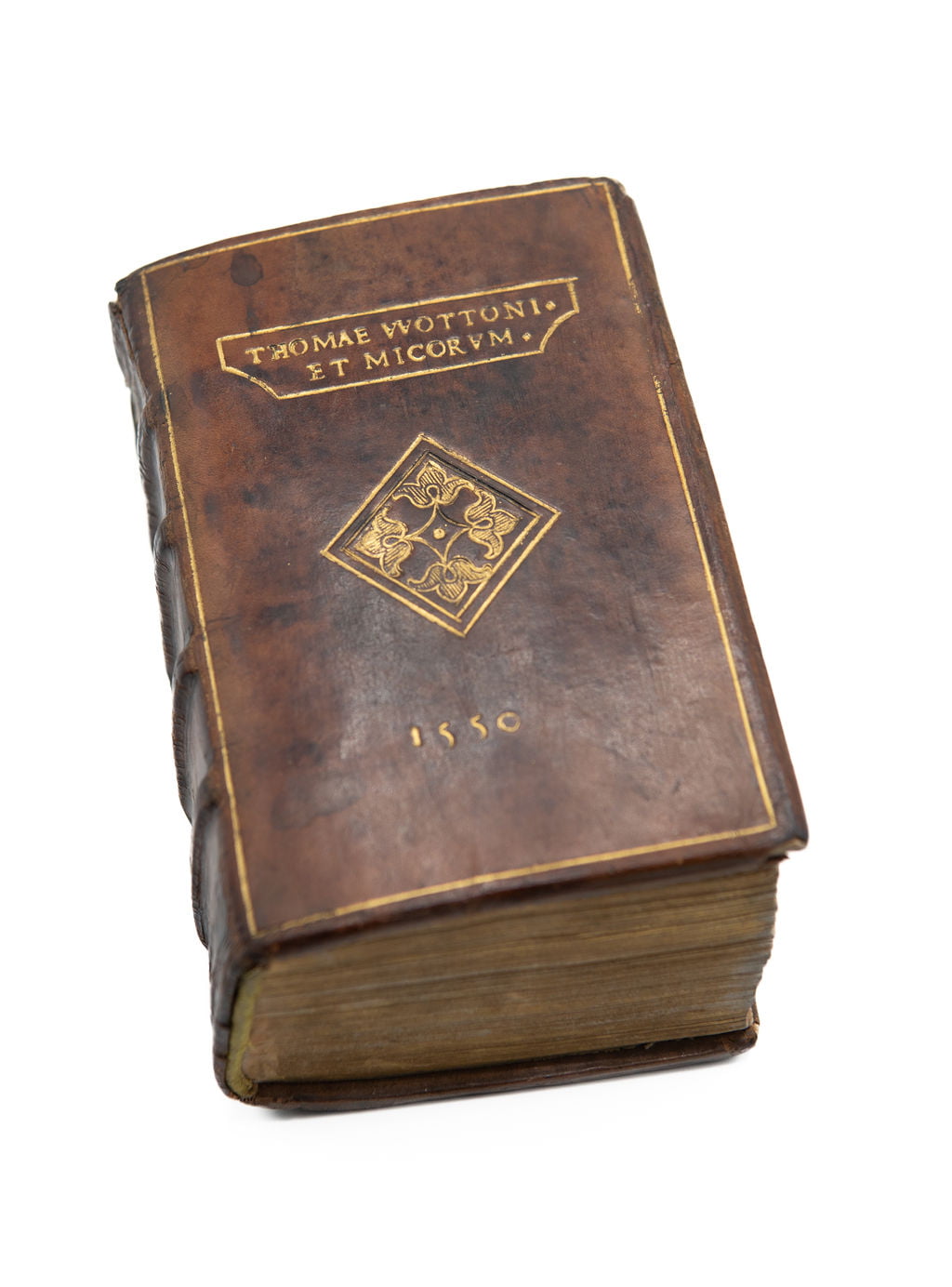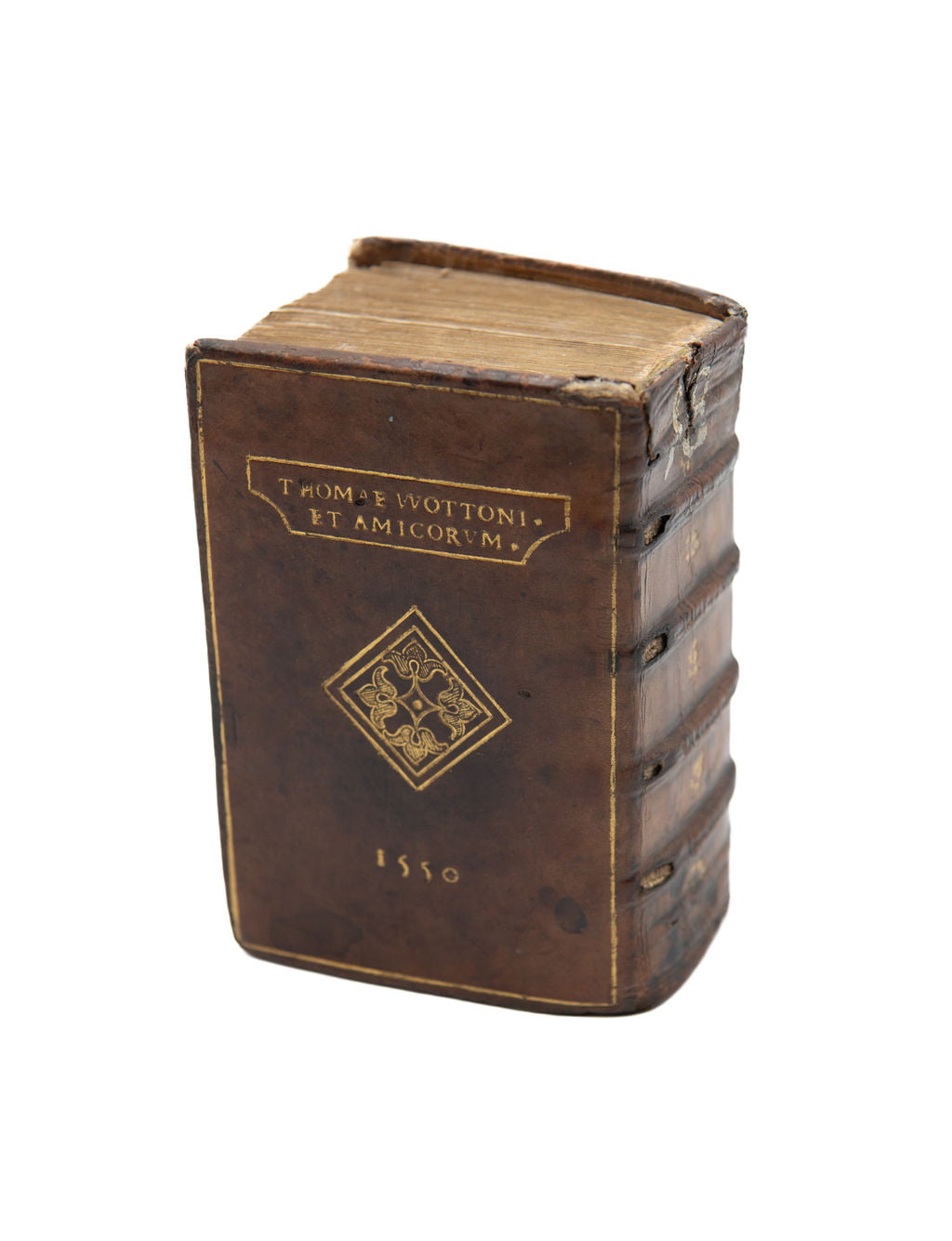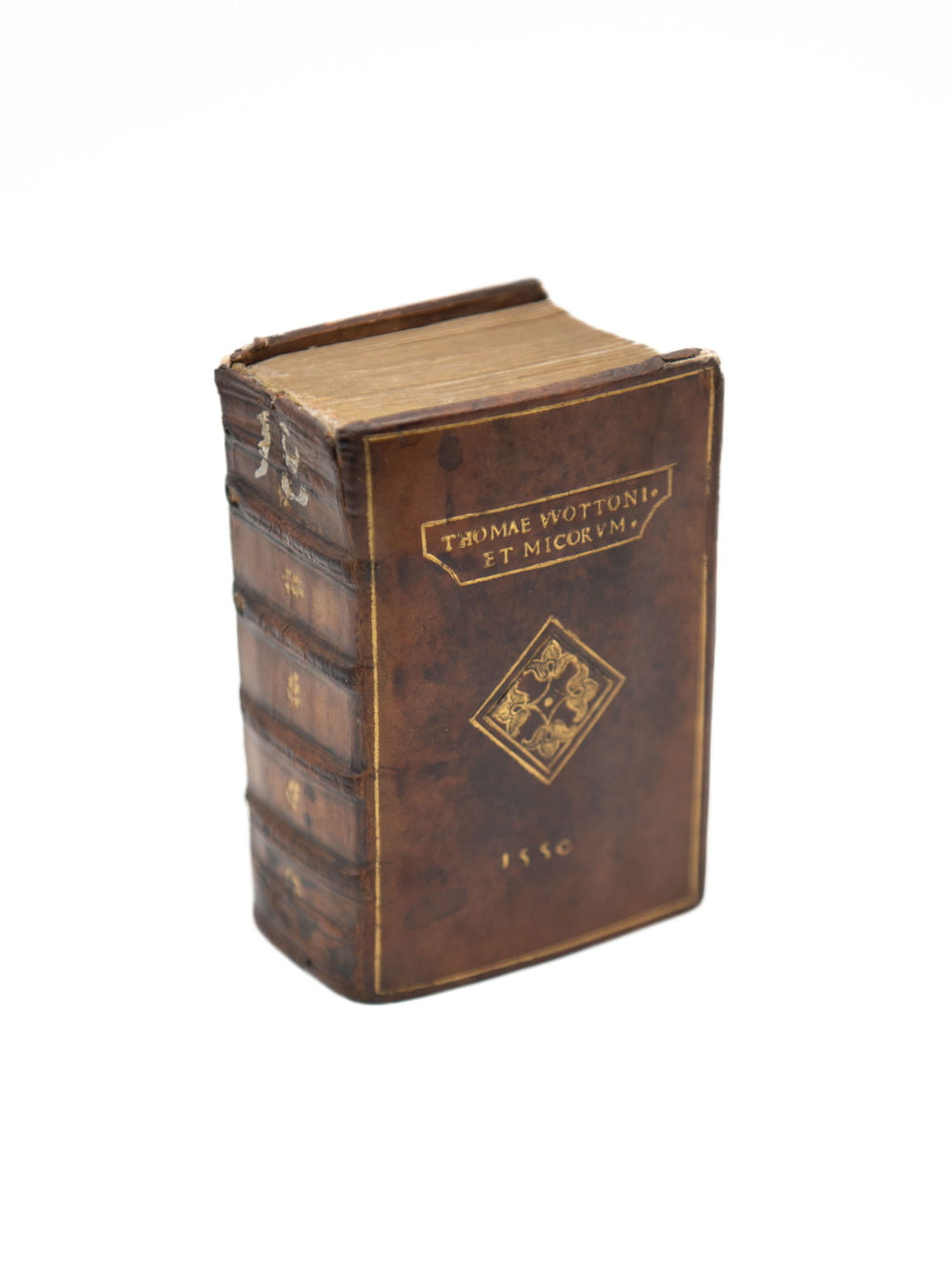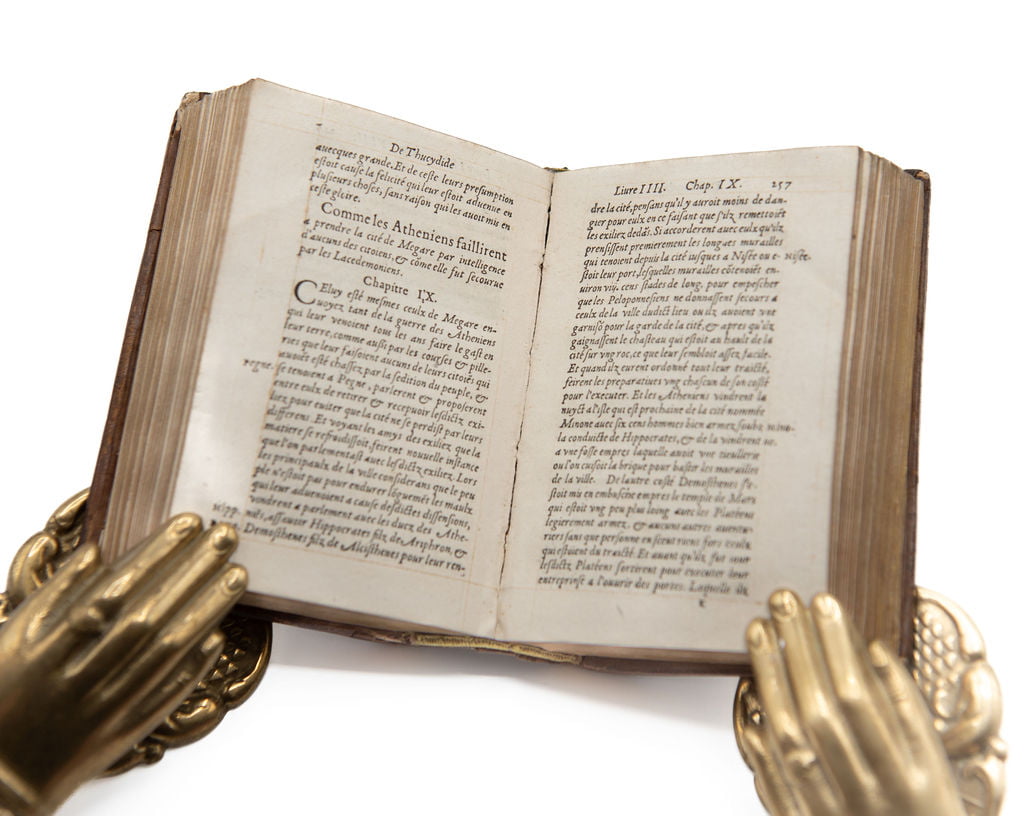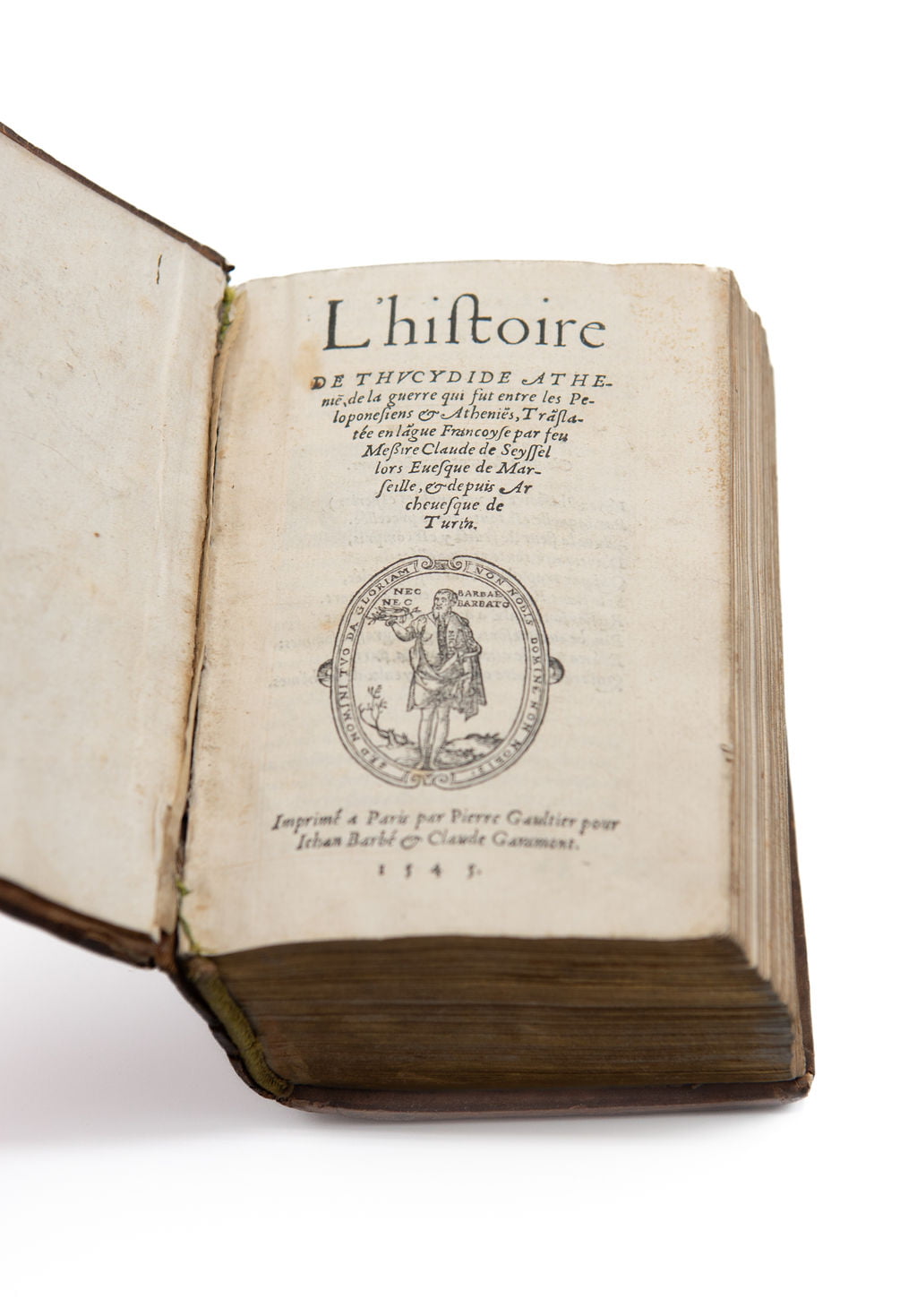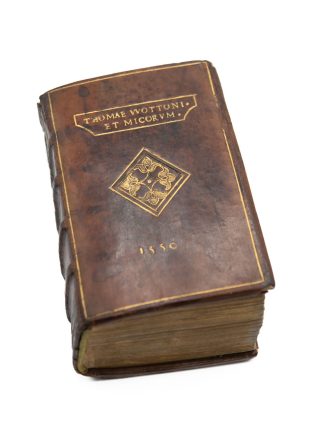THUCYDIDES
THOMAS WOTTON’S COPY
L’ histoire de Thucydide Athenien, de la guerre, qui fut entre les Peloponesiens et Atheniens, translatée en langue francoyse
Paris, par Pierre Gaultier pour Iehan Barbé & Claude Garamont, 1545£40,000.00
16mo. ff. [xvi], 555 [i.e. 547], [xi]. a , , a-z , A-2Z , 3A . Italic letter, chapter headings and side notes in Roman. Ruled in red throughout. Barbé’s woodcut printer’s device on title, white on black criblé initial, armorial bookplate of Boies Penrose II on pastedown, Robert S Pirie’s on fly with his pencil note above ‘This book was left to me in his will by John Fleming 1987’. Very light age yellowing. A fine copy, in simple but very elegant contemporary French calf bound for the library of Thomas Wotton, covers bordered with a single gilt rule, ‘Thomae Wottoni et Micorum’ gilt lettered on upper cover, ‘Thomae Wottoni et Amicorum’ on lower, both within gilt line border using double capital ‘V’s to create the ‘W’ of Wotton, 1550 gilt below, double gilt ruled central lozenge, with four repeated gilt hatched fleurons at centre, spine with blind ruled raised bands, small fleurons gilt at centres, shelf mark ‘J8’ in white paint in top compartment, all edges gilt, small crack to upper joint and headband, corners slightly worn, raised bands with small holes to lower side. Preserved in a black morocco folding box gilt.
Beautifully printed edition of Claude de Seyssel’s translation into French of Thucydides’ famous History, beautifully preserved in a simple but very elegant binding made for the library of the most celebrated English collector of the C16th, the ‘English Grolier’, Thomas Wotton of Boughton Malherbe, Kent. “Thomas Wotton, the ‘English Grolier’ was the first Englishman to collect a planned library of gold-tooled bookbindings. About 140 volumes have survived from his library. A large group of these bears the Grolier-like tooled inscription Thomae Wottoni et Amicorum’, some have stamped armorials, some ..have the simple tooled date 1552, and some have no special signs of ownership on their covers but can be traced back to him by provenance. Wotton belonged to a prosperous Kentish family… is not known to have attended either of the English universities, but his library suggests an educated man with good knowledge of Latin the language of scholarship; he did not own any Greek texts.” Needham. According to Nixon, this binding is part of “group IV. Simple bindings before 1553, type D”.. “Binding [with] ownership inscription in the form THOMAE WOTTONI ET AMICORUM and the date 1550. In place of the medallions, this has a lozenge containing four impressions of a tool”.
Thucydides has been described as the father of ‘scientific history’ because of his strict standards of evidence gathering and analysis of events in terms of cause and effect. He has also been called the father of the school of political realism viewing relations between states as based more on might than right. His text is still studied in military colleges throughout the world. Thucydides also makes the interesting, if somewhat cynical, analysis of human nature in explaining human behaviour in the context of wars, plagues and all sorts of disasters. Viewed in the highest regard by subsequent Greek historians, then ignored throughout the Middle Ages, Thucydides had some influence on Machiavelli, but much more on Hobbes who translated him, and was idolised by Schiller, Schlegel, Nietzsche, Macauley and von Ranke. Woodrow Wilson read him on the way to the Versailles conference, and Thucydides’ influence was increasingly felt in international relations during the period of the cold war. The Peleponnesian War of which Thucydides wrote was an epic 27 year struggle for supremacy between Athens and Sparta and their respective allies. It probably continued after Thucycides’ death. Thucydides is the political historian par excellence, a meticulous recorder of public events, in which he had fought and from which he was never far removed. He assiduously researched written documents and personally interviewed eye-witnesses whose testimonies he wrote up into somewhat stylistic speeches.
Seyssel, (c.1450-1520) was a Savoyard scholar, diplomat, and churchman, successively Bishop of Marseille and archbishop of Turin. He served under Louis XII and was sent on diplomatic missions in Flanders, Switzerland, England and Italy. He collaborated with the Byzantine refugee Janus Lascaris on translations of ancient Greek historians, Lascaris translating from Greek to Latin and Seyssel from Latin to French; between them they produced the first French translations of Herodotus, Thucydides, Diodorus, Appian, and Xenophon.
A lovely copy of this work from perhaps the most famous collection of bindings owned by an Englishman. Books from Wotton’s library are exceptionally rare and have been always been highly sought after by book collectors.
BM STC Fr. C16th p. 421. USTC 39033. (one copy in US libraries, Michigan University Library). Brunet V 848. Nixon, Twelves Books in Fine Bindings from the Library of J.W. Hely-Hutchinson, 1953, pp. 32-48; Needham, Twelve Centuries of Bookbindings, no. 53.In stock


